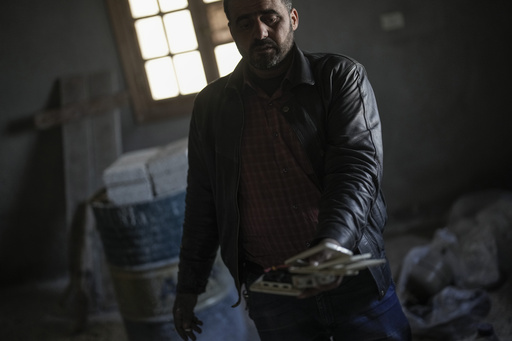
QAMISHLI, Syria — For over fifty years, the Kurdish population in Syria faced marginalization under the Assad regime, enduring a lack of citizenship and being misidentified as Arabs. However, in the current political climate following Assad’s rule, the Kurds are seizing the opportunity to solidify their cultural advancements in the northeastern territory which they developed amid the country’s civil unrest.
Mothers now have the liberty to name their children with Kurdish names, and Kurdish is taught in local educational institutions. The New Year celebration known as Nowruz can now occur without fear of repression. The Kurds, a significant ethnic group without a sovereign state, are experiencing a newfound sense of autonomy and are eager to secure it with the establishment of a new governing entity.
This desire for permanence in their developments hinges on the actions of Syria’s new leaders and the ongoing conflict with Turkish-backed opposition forces, which has escalated amidst the transition from Assad’s regime. The two-month-long strife has resulted in numerous casualties on both sides.
“We have achieved so much and will not relinquish it, even if it costs us our lives,” stated Amira Ali, a Kurdish woman from Hassakeh, emphasizing the determination of her community to hold on to their newfound rights.
Following the commencement of the uprising against Assad in 2011, the Kurds swiftly took control of areas previously abandoned by government forces, resulting in the establishment of Kurdish-led entities that now manage approximately 25% of Syrian territory. This region is often referred to as “Rojava Kurdistan.”
Currently, Kurdish leaders are in discussions with authorities in Damascus about their future. The Kurds constituted about 10% of Syria’s population before the war, seeking not complete autonomy but rather decentralization to manage their local affairs effectively.
However, the new governing bodies are allied with Turkish-backed factions that initiated hostilities against the Kurds during the turmoil following Assad’s reign. Recent skirmishes with the Syrian National Army (SNA) have led to the displacement of around 100,000 individuals.
This conflict bears considerable significance for the future of Syria as the current government, composed of the Hayat Tahrir al-Sham group, aims to consolidate its power and foster reconstruction after years of civil war.
Mazloum Abdi, the leader of the Syrian Democratic Forces (SDF)—the primary Kurdish-led faction—advocates for a secular and decentralized Syrian state that guarantees equal treatment for all citizens. Western nations have urged the new Syrian leadership to protect minority rights and ensure respect for women.
Abdi reminisced about the Syrian identification cards that historically labeled all citizens as “Syrian Arab citizens,” ignoring the existence of non-Arab groups such as the Kurds. He strongly demands that these cards be updated to reflect them as “Syrian citizens.”
Notably, Kurds played a pivotal role in combating the Islamic State during its brutal campaign across Syria and Iraq throughout the civil war. The SDF emerged as a key counter-force, and in 2019 successfully liberated the final territory occupied by IS in eastern Syria.
The SDF has suffered significant losses in their battles against IS militants and Turkish-backed factions. Turkey classifies the SDF as a terrorist organization due to its connections with the Kurdistan Workers’ Party (PKK), which has long sought independence for Kurdish regions in Turkey.
Since 2016, Turkey has conducted four military incursions into northern Syria, capturing substantial territories. As the situation evolves post-Assad, the future of such operations remains uncertain.
Northeastern Syria is filled with memorials and photographs honoring fallen Kurdish fighters. Amina Hussein, a grieving mother, expressed hope that the sacrifice of these martyrs would not be in vain as she honored her son’s grave.
“The Kurds have achieved a lot; we must protect our advancements,” she stated on a chilly morning at the Martyrs Cemetery where many fighters are laid to rest.
The assault by Turkish-supported factions looms as a new threat to the Kurdish progress made in recent years. Goulieh Abdu, a 70-year-old woman who has been displaced twice recently, shared her anguish over the constant turmoil as she takes refuge in a facility that used to belong to pro-Assad forces.
“I swear that the agony of displacement is killing us,” lamented Abdu, expressing her despair amid the ongoing conflict.
Another resident, Elham Horo, also fled her home due to the SNA’s offensive, stating, “We have lost everything. If they wish to take our lives from us, let them.” She sat with her family in a makeshift shelter converted from a classroom in Qamishli.
In Tel Rifaat, captured by the SNA, fighters accused Kurdish forces of displacing Arab residents over the years, while some returning Arabs claimed their homes had been wrecked by the preceding Kurdish occupants.
SDF and Damascus officials have reportedly shown optimism in their discussions regarding the future of the Kurdish regions within Syria. They have acknowledged the unjust treatment of Kurds during the Assad administration and are advocating for justice and equality to be established in the nation moving forward.
“We are committed to building a country where everyone enjoys equal rights,” Syria’s Foreign Minister Asaad al-Shibani communicated in Kurdish through a social media platform.

